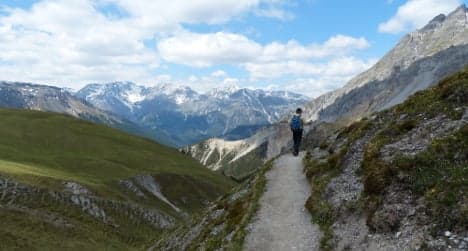Report: deaths among hikers at five year high

The number of people dying from classic mountain sports in Switzerland rose by a huge 48 percent last year, according to the Swiss Alpine Club (SAC).
In total 213 people died in the Swiss Alps and Jura in 2015, compared with 162 in 2014, SAC said in a statement.
Of those, 142 lost their lives whilst practising classic mountain sports including rock climbing, hiking, high-alpine trekking, ski-touring, off-piste skiing and snowshoeing, a 48 percent increase on the previous year and the highest number since 2011.
That figure does not include extreme sports including paragliding, speed-flying, base-jumping and mountain biking, said SAC.
Among the sports included, the highest rise was among hikers, 64 of whom died in 2015 compared with 39 the previous year.
Falling was the biggest cause of death with 98 victims, 61 of them hikers.
Avalanches cost the life of 33 people, compared with 16 in 2014.
“Different factors explain the increase in emergency situations and accidents compared with previous years,” SAC said in a statement.
Among them were “an often high avalanche risk during winter, a good summer favourable to mountain activities and a particularly mild autumn that was good for hiking”.
However it wasn’t a record year for mountain accidents, it stressed, saying that the figures were often higher in the 1980s and 90s.
Of those victims who were hiking and snowshoeing, half of them were in the mountains alone, said SAC, which emphasized the need for solo hikers to take extra precautions.
“Though it’s always preferable not to set out alone, people have good reasons to hike or snowshoe on their own. But you must always be aware that you will also be alone if you have an accident,” said SAC.
Since mobile coverage is often patchy in the mountains, SAC advises people to carry an emergency radio from air rescue service Rega, particularly when visiting more remote areas.
“It is advised to tell someone about your itinerary and expected timings,” it added.
In total mountain rescue services helped 2,750 people in the Alps during 2015, a 12 percent rise on 2014.
Among them, 951 were uninjured or only slightly hurt.
SAC’s figures are based on data gathered from several rescue services in Switzerland including Rega, Swiss mountain rescue SAS and Valais rescue service OCVS.
Comments
See Also
In total 213 people died in the Swiss Alps and Jura in 2015, compared with 162 in 2014, SAC said in a statement.
Of those, 142 lost their lives whilst practising classic mountain sports including rock climbing, hiking, high-alpine trekking, ski-touring, off-piste skiing and snowshoeing, a 48 percent increase on the previous year and the highest number since 2011.
That figure does not include extreme sports including paragliding, speed-flying, base-jumping and mountain biking, said SAC.
Among the sports included, the highest rise was among hikers, 64 of whom died in 2015 compared with 39 the previous year.
Falling was the biggest cause of death with 98 victims, 61 of them hikers.
Avalanches cost the life of 33 people, compared with 16 in 2014.
“Different factors explain the increase in emergency situations and accidents compared with previous years,” SAC said in a statement.
Among them were “an often high avalanche risk during winter, a good summer favourable to mountain activities and a particularly mild autumn that was good for hiking”.
However it wasn’t a record year for mountain accidents, it stressed, saying that the figures were often higher in the 1980s and 90s.
Of those victims who were hiking and snowshoeing, half of them were in the mountains alone, said SAC, which emphasized the need for solo hikers to take extra precautions.
“Though it’s always preferable not to set out alone, people have good reasons to hike or snowshoe on their own. But you must always be aware that you will also be alone if you have an accident,” said SAC.
Since mobile coverage is often patchy in the mountains, SAC advises people to carry an emergency radio from air rescue service Rega, particularly when visiting more remote areas.
“It is advised to tell someone about your itinerary and expected timings,” it added.
In total mountain rescue services helped 2,750 people in the Alps during 2015, a 12 percent rise on 2014.
Among them, 951 were uninjured or only slightly hurt.
SAC’s figures are based on data gathered from several rescue services in Switzerland including Rega, Swiss mountain rescue SAS and Valais rescue service OCVS.
Join the conversation in our comments section below. Share your own views and experience and if you have a question or suggestion for our journalists then email us at [email protected].
Please keep comments civil, constructive and on topic – and make sure to read our terms of use before getting involved.
Please log in here to leave a comment.